I've been meaning to write something on the situation in Catalunya for some time, but the longer I left it, the more "out of the news" it became, to the point where it became a bigger and bigger task to explain things over again. However, the massive demonstration on 10 July in support of Catalunya's right to decide its own future has brought the political situation in Catalunya right back into the spotlight.

The demonstration was sparked by the decision of the Spanish Constitutional Tribunal (TC) to declare that some of the articles in Catalunya's Statute of Autonomy are unconstitutional. The Statute was passed in 2006 to replace the earlier version of 1979, which was part of Spain's transition to democracy after Franco's death in 1975. It was presented by the Catalan Parliament with support from all parties except the Partido Popular, then passed by the Spanish Parliament after amendment by them, then finally ratified in a referendum. Although the vote in favour was high (73.2% to 20.6%) the turnout was 48.9% ... which either reflected the degree to which it had been watered down or showed that Catalans were not very interested in their constitutional position, depending on one's political standpoint.
The Statute was then challenged by the Partido Popular in the Constitutional Tribunal on matters relating to Catalunya's autonomy, and by surrounding autonomous communities on other matters particularly to do with finance. Although the "headline issue" was whether Catalans were allowed to consider themselves a nation or not, the ruling had many other facets, including:
• the right of the Catalan Government to have a bilateral relation with the Spanish Government
• the obligation to know Catalan language in order to work in the public sector
• the Catalan Supreme Court of Justice as the highest court for certain kinds of laws
• minimum levels of infrastructure investment and limit on the degree of fiscal equalization
Some of these rulings are inconsistent in that, for example: the bilateral relations are essentially similar to those enjoyed by Euskadi and Navarre, and the proposed Justice Council of Catalonia is modelled on what other communities such as Andalusia already have. The fiscal provisions were intended to limit the amount that could be transferred from Catalunya to the remainder of Spain (it is the richest area in Spain second only to Euskadi) and to guarantee a minimum share of infrastructure investment, following the German model. These details are taken from this article, which is the most complete account of the ruling I have been able to find.
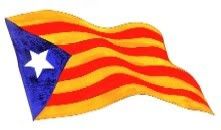
For information, it's probably worthwhile to look at the political parties in Catalunya, what they stand for, and their level of support. Ranked in terms of their vote in the 2006 election to the Catalan Parliament they are:
• CiU - Convergència i Unió ... centre-right, pro-autonomy (31.5%)
• PSC - Partit dels Socialistes de Catalunya ... centre-left (26.8%)
• ERC - Esquerra Republicana de Catalunya ... left, pro-independence (14.0%)
• PP - Partido Popular ... right, anti-autonomy, pro-Spain (10.7%)
• ICV - Iniciativa per Catalunya Verds ... coalition of left and Greens (9.5%)
• Cs - Ciutadans ... left, anti-autonomy, pro-Spain (3.0%)
The current Catalan government is made up of a broad left alliance between the PSC, ERC and ICV. This coalition was formed after the 2004 election, and the ERC's participation in government was at the price of securing the new Statute of Autonomy with a PSC that had always been lukewarm about it before. Negotiations between Barcelona and Madrid were also helped by the fact that the socialist Zapatero had just become First Minister of Spain. But the ERC felt that the negotiations compromised too much and left the coalition, prompting an early election in 2006. The election didn't change much, and they re-entered the coalition having to accept that the new SoA wouldn't be any stronger. CiU would also have wanted it to be stronger, but in the end the new SoA had more than 80% support in the Catalan Parliament.
Now that several articles of the SoA have been struck down or amended, those same four parties formed the backbone of the demonstration on Saturday, along with a host of civic leaders and other prominent members of Catalan society. The principles that united them were that any constitutional question mark over the new SoA should have been sorted out when it was being considered by the Catalan and Spanish Parliaments, and certainly before being approved in a referendum; and that it was up to the people of Catalunya to decide their constitutional future, not the Spanish State.
In all probability the march was organized on the basis that it is for the people of Catalunya to decide their future, and not to have something they have already approved retrospectively amended. However I'd guess it was a surprise to some of the organizers that there were so many pro-independence banners in the crowd. It wasn't organized as a pro-independence march ... but that is definitely what it turned out to be. So it is worth considering why the public mood in Catalunya has shifted from respect for the enhanced autonomy the Catalans thought they had to independence. Up until now, the only pro-independence party has been the ERC. They are the party that Plaid Cymru and the SNP work with in the European Parliament as part of the EFA.

The current rise of support for independence probably springs from the series of non-official independence referendums that started with the one in Arenys de Munt in September. There was a second round in December. Both these resulted in over 90% support for independence from those who voted, making turnout the critical factor. In the second round the turnout was 27.3%, which would have been enough to secure a victory if the turnout had been about 52.4% ... and if anyone thinks I was being over-clever with my maths, it was gratifying to see Artur Mas, leader of CiU, echo what I had said. But subsequent rounds of voting have been more disappointing for those wanting independence, with the turnout falling to 20.2% in April and most recent round having a turnout of 13.7%.
There are two ways of viewing this. For unionists, it is a demonstration that support for independence is low, particularly in the more urban areas. However it should be noted that these referendums have been organized unofficially by volunteers without the use of any official resources, most notably in terms of information and publicity. One useful parallel would be to compare these turnouts with the turnout for an official referendum and, as luck would have it, there was one of these in Barcelona in May this year on the future of the Avinguda Diagonal, one of Barcelona's main thoroughfares. Despite all the publicity events, the use of official facilities and a budget of over €3m, the turnout in that referendum was only 12%.
But even so, there was a general sense of disappointment that the unofficial independence referendums had not resulted in a higher turnout. However a second possibility has opened up, because it is now possible to organize official referendums on citizens' initiatives if they can collect enough signatures. The Catalan government has allowed the initiative to go ahead, and the signatures of 3% of the electorate (about 220,000) are required within a six month period. There is little doubt in my mind that this number of signatures will be gathered simply because of the numbers who have already voted Yes in the referendums to date, but what happens after that is more problematic. A similar referendum in Euskadi in 2008 was banned by the Spanish State.

A third development is that two more pro-independence groups have recently been formed. The first, Reagrupament, set itself up with the specific aim of getting enough deputies to the Catalan Parliament elected with a pro-independence mandate—either under its own name or by getting other parties to adopt that specific policy platform—in order to declare independence unilaterally. The thinking behind this is that the Spanish won't let Catalans vote in a referendum, therefore declaring unilateral independence will allow them to set up a referendum without Spanish interference. Other countries, as well as the EU and UN, would be almost certain to recognize that independence if it was confirmed in a properly held referendum, and the Spanish would not dare to take control by military force.
For some time there was speculation that Joan Laporta (the recently retired President of Barcelona FC and unambiguously pro-independence) would join or even become co-leader of Reagrupament, but he has decided to set up his own party, Democràcia Catalana, as a vehicle by which he hopes to become President of Catalunya. Of course it is not out of the question for the two groups to form an alliance for the election.
Against that melting pot of possibilities, the thing that matters more than anything is public opinion. Last December I pointed to a poll that showed 51% in favour of independence but didn't get round to mentioning a later poll conducted for El Periódico. Yet it just so happens that they commissioned another poll in June, and the results of both are:
If an official referendum on
independence for Catalonia were held,
would you vote for or against?
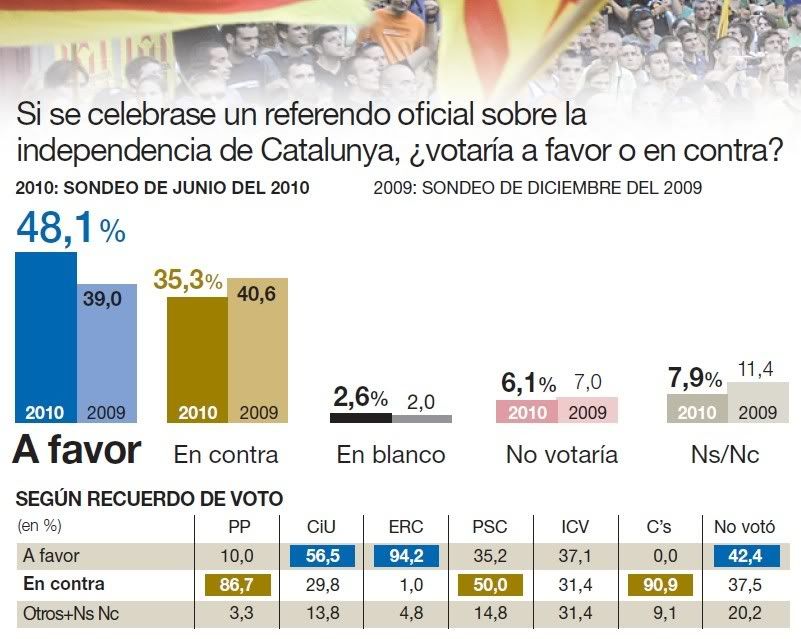
Parliament has accepted an initiative to hold an official referendum on
independence. Do you think it appropriate to hold it at the moment?
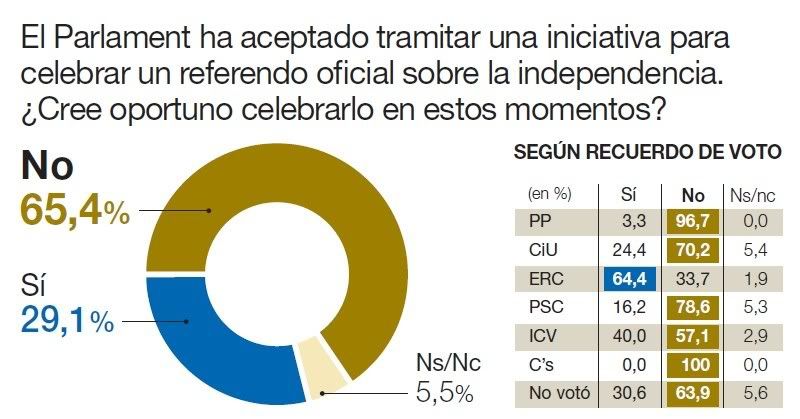
Do you think he the necessary signatures (25,000*) will be collected
to progress it? [MH: this must be a misprint for 250,000]
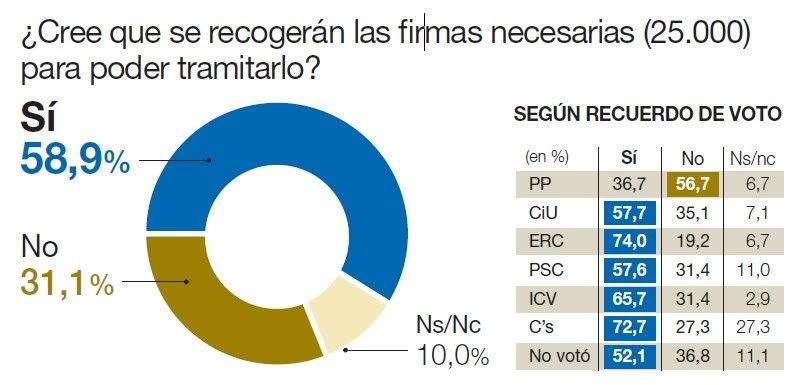
If the signatures are obtained, do you think that the Catalan Parliament
would approve holding the referendum?
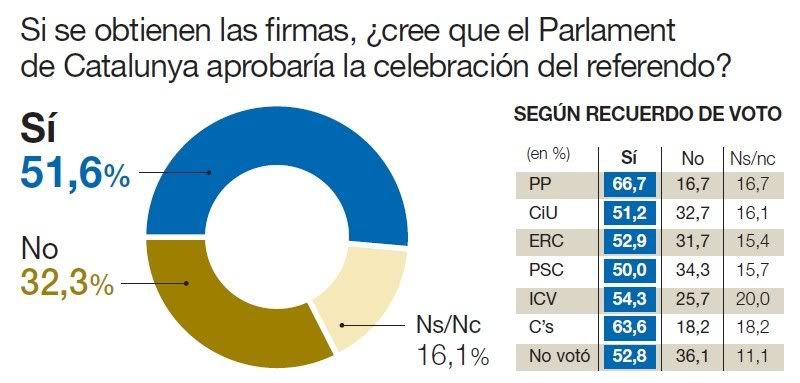
Do you think the Spanish government would allow this referendum to
be held?
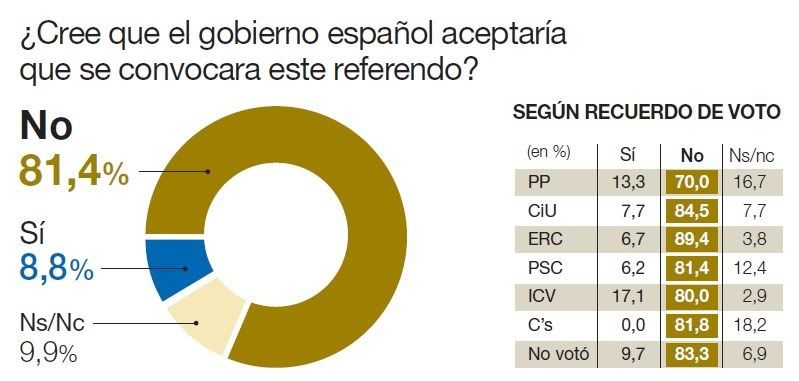
Apart from the headline figure showing a margin of 48.1% to 35.3% in favour of independence, what is most interesting to me is the breakdown by political party. Of course supporters of ERC are solidly in favour of independence, and those of the PP and Cs are solidly against; but the other parties are more interesting.
-
The majority of CiU supporters, by a margin of almost 2:1, are in favour of independence (and the same was true in the breakdowns for last December). Now CiU has always been a Catalan nationalist party, but in favour of greater autonomy for Catalunya within Spain rather than independence. So the choices for the CiU leadership are stark, for no political party can stand against something that most of its supporters want. If CiU now shifted its policy to one of pro-independence, the chance of independence would grow dramatically because they are the biggest party in Catalunya, even though kept out of government by a coalition of the three left leaning parties. If it doesn't shift its policy, there is every chance that voters could shift from CiU to either Reagrupament or to Laporta's new party, which would position themselves on the centre right so as to catch those votes, knowing that left-leaning independence supporters would vote ERC.
It's a choice that CiU would much rather not have to make. So it is concentrating its effort, along with the PSC, on trying to get the Constitution of Spain changed so that there is no contradiction between it and the 2006 SoA. My opinion is that it's worth giving it a go for the sake of due process (and the ERC and ICV will join them in that) but that it won't happen. That's largely because public opinion in Spain has developed a markedly anti-Catalan streak, as was shown in this post.
-
Of the parties of the left, opinion among ICV supporters is fairly evenly divided, but with a very high percentage of don't knows. However that probably doesn't matter too much one way or the other for a party with less than 10% support. The PSC, on the other hand, has 27% support. Its problem is working out its relationship with its sister party in Spain, the PSOE. The situation is rather like that between Wales and Scotland and the UK. The PSOE needs PSC support to form a government in Madrid in just the same way as Labour needs its Welsh and Scottish MPs to have any chance of forming a government in Westminster.
So the chances of the PSC leadership agreeing to independence for Catalunya are very small, even though more than a third of their supporters want it.
-
The final factor is that the next Catalan elections will be held this coming Autumn. Things are very fluid, and it's hard to pick up on all the nuances of what is happening as parties and personalities jockey for position.

Well, that's the background as I see it. And even though things are complicated, you wouldn't want me not to make some predictions ... so here goes.
The referendum initiative will get 220,000 votes without any trouble. The PSC and CiU will try not to make an issue of it until after the elections because they will want people to vote primarily along the left/right lines for which they are the biggest parties respectively. Therefore the name of the game for those who want independence is to make independence a greater issue than the normal left/right divide of everyday politics. If ERC, Reagrupament and Laporta can make this the burning issue of the summer, UiC will be under great pressure to decide whether to take a pro-independence stance for fear of losing votes if they don't. The size of the demonstration last weekend suggests it will be, but UiC are doing very well in recent polls (over 40%) and may well think that they don't need to change anything.
I predict that UiC will commit themselves to holding a referendum. That's easy. But the big question is what position they will take when (for there's no question of it being an if) Spain refuses to let it go ahead, as they did with the Ibarretxe referendum in Euskadi in 2008. If they can't say what they will do when Spain blocks the referendum, it will lose them votes to Reagrupament and Laporta if independence can be made the main issue of the election.
Even though I would be disappointed to see them fall short, ERC, Reagrupament and Laporta will only get about 40% of the seats in the new Parliament. Because CiU will have committed themselves to a referendum it will be voted though in Parliament, but will be blocked by Spain. However neither CiU nor the PSC will be able to form a government that is not dependent on pro-independence parties of some political hue, and CiU deputies will not feel able to vote for a UDI because they were not elected on that mandate. So new elections will be necessary in Spring 2011. This time there will be nothing for the CiU to be ambiguous about, and they will have to adopt a pro-independence stance because all other avenues will be closed. The majority in the new Parliament will then be elected on a pro-independence mandate and will declare UDI, with a confirmatory referendum to be held within a few months under EU supervision.
It will be won.


8 comments:
It was good to see Hywel Williams raise the matter in the Commons, here.
I didn't notice it reported in the media over here, though.
The was a nice set of photos on the BBCs website- http://www.bbc.co.uk/news/10588562 Hopefully this will go somewhere, as there obvious support for Catalan indeprendence.
(On another note do you intend to look at the new investment in schools and its effect on Welsh Medium provision?)
A very interesting and informative post. I've learned a lot.
Anon, Yes, there were lots of pictures and I was spoilt for choice.
There seems to be a fair sprinkling of money in the package for WM schools. A new primary in Wrecsam, refubishing St Teilos as third secondary in Cardiff, a new primary in Llanelli (which I'm sure won't cost £14.6m), improvement/enlarging three primaries in Denbighshire. The schools in Gwynedd and Ceredigion will be de facto WM. So WM has probably got a fair slice of the pie.
The problem is that in places like Wrecsam, the council would only consider expanding their WM provision if they got money to build a new school, because it's too much of a hassle to close an existing EM school to make it WM.
And it's sometimes the case that a building a new EM school will leave the old building as a suitable home for a starter WM school.
-
Adam, that's very kind of you. Thanks.
Wps. I shouldn't believe everything I see just because it's in a glossy pdf. The actual number of signatures required is 220,000 according to this report. So I'd guess that the 25,000 in the survey is a misprint for 250,000.
I still think that's very achievable based on the numbers who have voted in the unofficial referendums ... but it does explain why 31.1% thought they wouldn't get that number.
I've amended the post itself to reflect this, and apologize for the confusion.
A small correction re the Wrecsam education issue you touched upon... most EM schools in Wxm are over-subscribed due to rapid population growth, so there aren't any available buildings to become WM schools. Not a matter of "not wanting the hassle", just practicalities.
Are you sure about that, Plaid W? The figures I have are a little old (SEP, 2006-2008) but they show that Wrecsam had 2,809 surplus primary places out of a total capacity of 13,104 - which equates to 21.4%. (If you have later figures please let me know, but I haven't found them on the council website.)
So in general terms, it does look like there is room for at least a couple of new WM schools to be started in EM buildings. But in local terms, I do accept that the situation might well be different because of new housing and the like. Each situation is unique.
I'm very glad that you've got this money to build a new school, but where is the next WM school going to come from? The answer can't be that you will only get one if the Welsh Government gives you money to build a new one. Wrecsam, and other councils, have to look at re-allocating the space they already have; and if each change can be planned out over a six year transition period, no child would be forced to move school.
A link to my own vídeo over this day.
Thanks for your knowledge about my Country.
http://www.youtube.com/watch?v=DOjZxfF51PE
Post a Comment